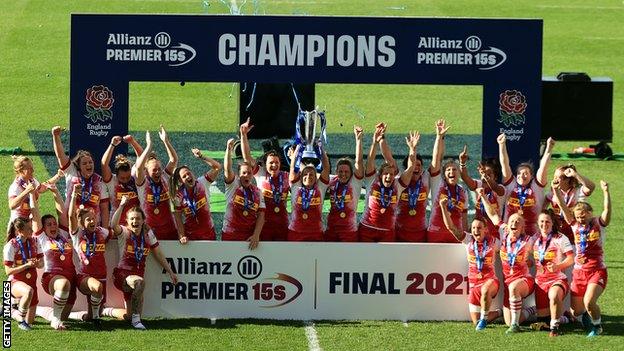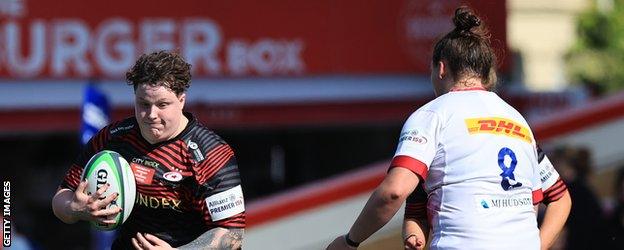Premier 15s: Why Harlequins and Saracens are better together
- Published

Defending champions Harlequins' game against two-time winners Saracens on Saturday will be live on the BBC Sport website
Premier 15s - Harlequins v Saracens |
|---|
Venue: Twickenham Stoop Dates: Saturday, 5 February Kick-off: 14:00 GMT |
Dominating the Premier 15s since its inception, Harlequins and Saracens have the league's fiercest rivalry.
Behind the scenes, it is a different story.
The two teams - who have featured in all three of the Premier 15s finals to date - face off at Twickenham Stoop in what Quins are calling 'The Game Changer' on Saturday.
On the field, a host of international stars on both sides will be battling for victory but off it, the key theme is collaboration rather than confrontation.
Both clubs ultimately want the same thing: a highly competitive, professional women's rugby union league in England.
Both have led the way on the journey so far, with Saracens winning the title twice and Harlequins winning once.
BBC Sport spoke to the clubs' chief executives to find out where they want the sport to go in the future and the challenges that might stand in their way.
'I'd be disappointed if we weren't professional in 10 years'
At the moment the majority of Premier 15s clubs pay some, but not all, of their players.
Payment means different things at different clubs and with a salary cap of £120,000 for squads of around 40 players, the money does not go far.
Some sides offer a part-time salary, some match fees, others provide expenses and a minority offer no payment at all.
Advancing women's sport takes a certain amount of idealism mixed with a good dose of realism too - the salary cap is in place so that the richest clubs cannot simply buy victory.
While Saracens chief executive Lucy Wray hopes for a fully professional league in the next 10 years, if not sooner, she knows there are obstacles to overcome.
"The challenge will be the investment required," she explains.
"It's going to require investment up front before you get anywhere near breakeven because you've got to grow the audience.
"You need to invest in your coaching, facilities, strength and conditioning staff, medical provision, physios."
Harlequins chief executive Laurie Dalrymple agrees, but hopes to see big developments between the 2022 and 2025 World Cups.
"We're investing heavily into the sport because we know the value's there, we know the quality is there," he says.
"We hope the commercial benefits are going to follow quickly on the heels of some really strong performances and output."
'We want to be pushed every week'

Saracens' only defeat this season was against Harlequins in December
Along with their willingness to collaborate, neither side wants an easy ride in the league.
This season is the Premier 15s' most competitive ever and Wray and Dalrymple celebrate that.
Saracens have a comfortable seven-point lead at the top of the table having lost just one game - to Quins in December.
But defending champions Harlequins sit fourth and are fighting to remain in the top-four play-off positions with Bristol, Exeter and Wasps some of the sides showing improvement this term.
The only outlier in this upward trend is the winless DMP Durham Sharks, whom the Rugby Football Union has stepped in to help as they strive to keep a North-East representative in the top flight.
"You need to have a number of clubs all on the journey together and have a really good, strong league from top to bottom," Wray says.
"[People] want to see a really competitive league and rivalries all over the country. That's what puts people on the edge of their seats."
Dalrymple admits an "armchair ride" to victory might seem desirable, but it is not what Quins want.
He adds: "If it's to drive our performance level and for us to achieve the very best of our technical abilities, we want to be pushed to our maximum every single week."
'We're much stronger together'
The path to professionalism is a complicated one and in the meantime, outside of the 29 on full-time England contracts, players balance elite rugby with a job or studying.
But both club bosses are optimistic in a year when England are favourites to win the World Cup.
Should the Red Roses win November's final in New Zealand, Wray and Dalrymple should see even greater growth than they already have.
Saracens captured a new audience for their women's side by streaming games during the pandemic.
The club has now separated season tickets sales for their men's and women's teams rather than bundling them together as one and has seen a 1,000% increase in sponsorship revenue for its women's side since 2019.
As for Quins, Dalrymple believes the crowd at Saturday's game will be the women's side's "most genuine, authentic audience".
The club is expecting about 5,000 to attend at The Stoop, a number that Dalrymple says "speaks volumes".
Wray sums up the best way forward, saying: "On the pitch everyone wants to win. Off it, we all know we can't do it on our own.
"It's much better if we all do it together. We're much stronger all together."